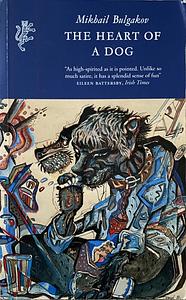You need to sign in or sign up before continuing.
Take a photo of a barcode or cover
dark
medium-paced
Plot or Character Driven:
A mix
Strong character development:
Complicated
Loveable characters:
Complicated
Diverse cast of characters:
Yes
Flaws of characters a main focus:
Yes
If books is a structure of love, Bulgakov is my guilty pleasure. Not gonna lie, I was so not prepared for possibility of the gory details of animal torture, but then, this is Russian Literature...so who knows?
I'm so not disappointed.
Not only delves into the complexities of identity and societal norms, but also into the complexities of identity and societal norms and offers a scathing critique of Soviet ideology. Bulgakov's novel, published in 1925, takes place during the early years of Soviet Russia and follows the story of a stray dog named Sharik (Later named as Sharikov) who is transformed into a human being through a controversial scientific experiment.
The novel can be read as a social and political commentary on the flaws and contradictions of the Soviet system. Bulgakov uses the character of Sharik to symbolize the transformation and dehumanization that occurred in Soviet society. Sharik is able to watch and analyze the world, revealing the post-revolutionary era's pervasive corruption, avarice, and lack of intellectual rigor, and eventually, became the mirror of the society itself.
The novel explores themes of class struggle, the search for identity, and the dangers of scientific experimentation gone awry. Despite its specific setting in Soviet Russia, "Heart of a Dog" is a timeless satire on the human condition, making them much relatable and relevant even after hundreds of years.
Also for those who read the version with Introduction by Andrey Kurkov, DO NOT SKIP IT. there are some juicy details on Stalin special treatment on Bulgakov, which makes me further read on Russian literature, political scenes and censorship policy in 1920s.
I'm so not disappointed.
Not only delves into the complexities of identity and societal norms, but also into the complexities of identity and societal norms and offers a scathing critique of Soviet ideology. Bulgakov's novel, published in 1925, takes place during the early years of Soviet Russia and follows the story of a stray dog named Sharik (Later named as Sharikov) who is transformed into a human being through a controversial scientific experiment.
The novel can be read as a social and political commentary on the flaws and contradictions of the Soviet system. Bulgakov uses the character of Sharik to symbolize the transformation and dehumanization that occurred in Soviet society. Sharik is able to watch and analyze the world, revealing the post-revolutionary era's pervasive corruption, avarice, and lack of intellectual rigor, and eventually, became the mirror of the society itself.
The novel explores themes of class struggle, the search for identity, and the dangers of scientific experimentation gone awry. Despite its specific setting in Soviet Russia, "Heart of a Dog" is a timeless satire on the human condition, making them much relatable and relevant even after hundreds of years.
Also for those who read the version with Introduction by Andrey Kurkov, DO NOT SKIP IT. there are some juicy details on Stalin special treatment on Bulgakov, which makes me further read on Russian literature, political scenes and censorship policy in 1920s.
funny
fast-paced
Plot or Character Driven:
A mix
Strong character development:
Complicated
Loveable characters:
Yes
Diverse cast of characters:
Yes
Flaws of characters a main focus:
Yes
dark
funny
reflective
medium-paced
Plot or Character Driven:
A mix
Strong character development:
Complicated
Loveable characters:
No
Diverse cast of characters:
No
Flaws of characters a main focus:
Yes
I still don't know if this book should be considered magical realism, because yes I can see the remnants of Marquez and the very obvious magical elements in it but at the same time it's used to convey such a meaning that it could also be a very strong metaphor supported (and carried out) by the beguiled characters in the novel.
Nevertheless, I, (although not knowing much about Russian politics) was able to notice the jabs towards the government and politics within the book— which never failed to amuse me. It's interesting, seeing the author reach directly to an audience in such a manner that it feels like he's poking the readers (incessantly) for them to notice the blatant criticism in a way, which in turn should urge them to actively be aware of the conditions they are living in.
Nevertheless, I, (although not knowing much about Russian politics) was able to notice the jabs towards the government and politics within the book— which never failed to amuse me. It's interesting, seeing the author reach directly to an audience in such a manner that it feels like he's poking the readers (incessantly) for them to notice the blatant criticism in a way, which in turn should urge them to actively be aware of the conditions they are living in.
dark
reflective
tense
medium-paced
Plot or Character Driven:
A mix
Strong character development:
Yes
Loveable characters:
No
Diverse cast of characters:
Yes
Flaws of characters a main focus:
Complicated
I might actually be in love with Bulgakov
Not as good as The Master and Margherita though
Not as good as The Master and Margherita though
challenging
dark
reflective
fast-paced
Plot or Character Driven:
A mix
Strong character development:
Complicated
Loveable characters:
Yes
Diverse cast of characters:
Yes
Flaws of characters a main focus:
Complicated
funny
fast-paced
Plot or Character Driven:
Character
Flaws of characters a main focus:
Yes
slow-paced
Plot or Character Driven:
A mix
Strong character development:
No
Loveable characters:
No
Diverse cast of characters:
Complicated
Flaws of characters a main focus:
Complicated
Wasn’t as funny as I expected. I could tell it was satire, but I left confused as to what exactly it was trying to say. Unsure if it was because of the translation but I found the writing style hard to focus on and somewhat uninteresting.



